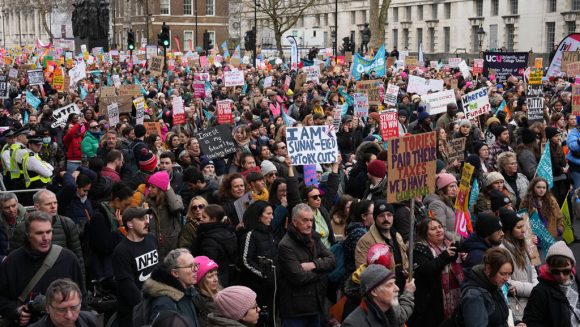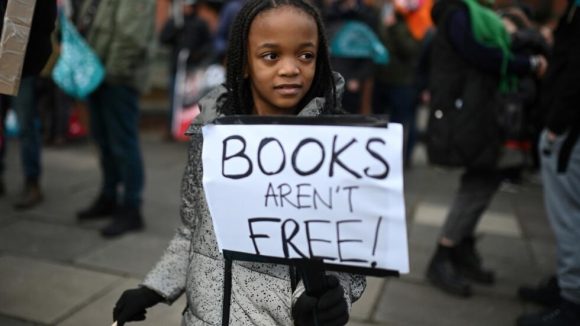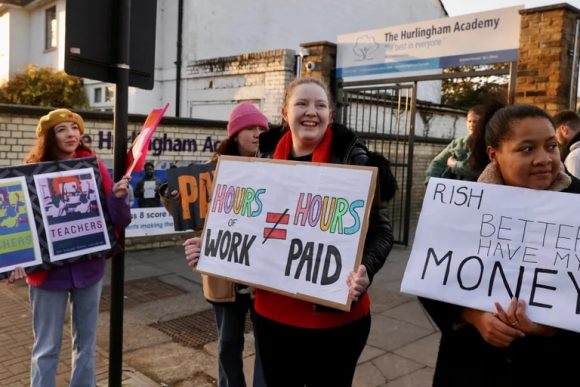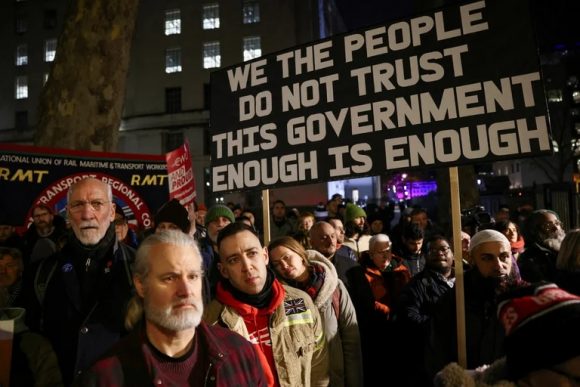
On Wednesday, the United Kingdom experienced its biggest strike in eleven years, with stoppages in many sectors. Photo: AFP
Schools are closed, trains are paralyzed, and officials are absent from several ministries. On Wednesday, the United Kingdom experienced its biggest strike in eleven years, with stoppages in many sectorsUnited by the demand for better wages against 10.5% inflation.
About 20,000 schools in England and Wales were affected by the first of seven strike days called by primary and secondary school teachers in February and March, adding to protests that began months ago in many other sectors.
“I’m a teacher in London and I’m having a hard time paying the rent,” she explained to France Press agency Ciara O’Sullivan, 38, is out of her school. “I have young children and I would like to give them something more than the basics,” she said, emphasizing that for now “Being a teacher is very stressful.”

About 20,000 schools in England and Wales were affected by the first of seven strike days called by primary and secondary school teachers in February and March. Photo: AFP
The teachers’ strike coincides with one of several pauses agreed to by train drivers from a dozen railway companies and employees from 150 universities.
Also with the work of about 100,000 officials from ministries, ports, airports and even driving license examination centers. In total, as many as 500,000 people are on strike.
In a country where demonstrations are rare, thousands of teachers marched to parliament and the offices of Prime Minister Rishi Sunak, to applause from passers-by and honking from motorists, holding placards calling for Save our schools.
Although every sector has its demands, all are united in demanding wage increases in the face of inflation that has been in excess of 10% for months (10.5% in December) and leaves many families with no other choice than food banks.

Although every sector has its demands, all are united in demanding wage increases in the face of inflation that has been in excess of 10% for months (10.5% in December) and leaves many families with no other choice than food banks. Photo: Reuters
This deep crisis prompted the nurses in December to stage their first national strike in their union’s more than 100-year history.
After failed negotiations with the government, they called for two more days of strike action in January and two more days for 7 and 6 February.
This final day will coincide with action in England and Wales by ambulance crews in what may be the biggest strike of Britain’s battered public health system, which has been plagued by years of austerity, since its inception in 1948.
Several student parents’ organizations stated in a statement that they “support” the teachers’ movement, noting that “The consequences of years of underfunding” in schools.
For its part, the executive branch is defending the need to impose a minimum level of services in key sectors and has introduced a bill for this purpose, the approval of which is progressing smoothly in Parliament.
“The government’s position is untenable. The unprecedented strike movement that continues to grow cannot be ignored.” skynos General Secretary of the CPC Civil Servants Union, Mark Sirotka, called for a “more pragmatic stance”.
Wednesday’s protest comes at a bad time for Sunak, on the eve of a crisis-marked 100 days in power and coinciding with the third anniversary of a Brexit in which only 20% of Britons consider they are on the right track, according to YouGov. Dec survey.
To name a few, a report released by the International Monetary Fund on Tuesday predicted that the UK will be the only G7 country whose economy is contracting by 2023.

Several parent organizations said in a statement that they “support” the teachers’ movement, citing the “ramifications of years of underfunding” in schools. Photo: Reuters
(With information from AFP)
